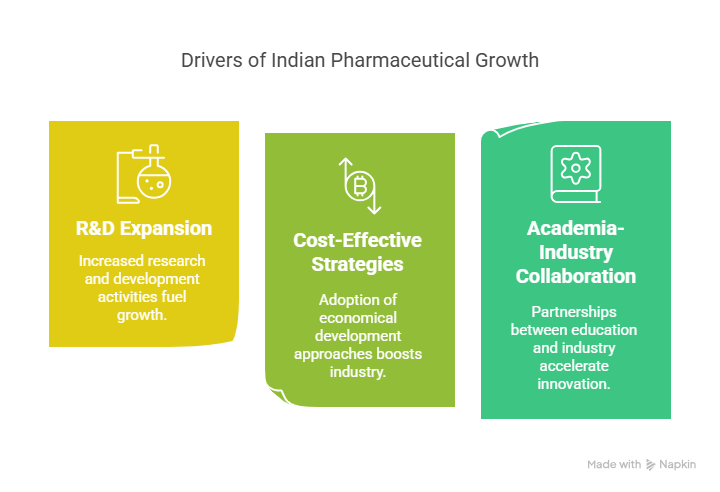Innovative ideas and state-of-the-art technology are poised to revolutionize the pharmaceutical sector. It’s obvious that the future of healthcare is changing as we see new trends and tactics develop.
Nanotechnology and personalized medicine are only two of the innovative advancements revolutionizing the sector. The field of pharmaceutical innovation is evolving into a more complex environment with the use of artificial intelligence and machine learning.
These developments will have an influence everywhere, including India, where there is a growing need for creative healthcare solutions. It’s critical to keep up with the most recent advancements in the production of pharmaceutical goods as the market continues to change.
Current Development Trends in Pharmaceutical Products
Developments in AI, nanotechnology, and customized medicine are influencing new trends in the creation of pharmaceutical products. Technological advancements and a better knowledge of human biology are driving a major revolution in the pharmaceutical sector.
Several phases of the development of pharmaceutical products are being revolutionized by the combination of artificial intelligence (AI) and machine learning (ML).
Applications of Machine Learning and Artificial Intelligence
The use of AI and ML to improve the efficacy and efficiency of pharmaceutical product development is growing.
The Use of Predictive Analytics in Drug Development
To find possible medication candidates and forecast their safety and effectiveness characteristics, predictive analytics is being used. The time and expense involved with conventional drug development techniques are greatly decreased by this strategy.
Quality Control and Process Optimization
Algorithms using AI and ML are now being used to guarantee quality control and improve industrial procedures. These technologies aid in detecting any problems before they become serious by evaluating data from several manufacturing phases.
Methods of Personalized Medicine
Because it enables customized therapies that address each patient’s unique requirements, personalized medicine is becoming more and more popular. This strategy entails figuring out the patients’ genetic composition and creating tailored treatments.
Healthcare professionals are able to deliver more effective treatment choices by using genetic data and sophisticated diagnostic technologies.
Drug Delivery Systems Using Nanotechnology
The potential of nanotechnology in medication delivery systems is being investigated. It enhances bioavailability and makes tailored therapy development possible.
Targeted treatment is made possible by nanotechnology, which lowers side effects and increases effectiveness by delivering medications straight to the afflicted cells.
Improvements in Bioavailability
It is possible to create nanoparticles to increase the bioavailability of medications, improving the efficacy of therapies.
| Trend | Application | Benefit |
|---|---|---|
| AI and ML | Predictive analytics, process optimization | Reduced time and cost, improved quality |
| Personalized Medicine | Tailored treatments | More effective treatment options |
| Nanotechnology | Targeted therapy, bioavailability enhancement | Improved efficacy, reduced side effects |
India’s Contribution to Pharmaceutical Development
The Indian pharmaceutical sector is becoming a major force in the global pharmaceutical innovation scene as it keeps expanding. The expansion of research and development (R&D) activities, the adoption of cost-effective development methodologies, and the growing cooperation between academia and industry are some of the causes driving this rise.

India’s R&D Center Growth
Due to both foreign and indigenous investments, India has seen a notable rise in the number of R&D facilities. These facilities are essential for fostering innovation in the pharmaceutical industry, facilitating the creation of novel medications, and enhancing current production procedures.
India’s qualified labor, advantageous regulatory environment, and government incentives are all factors contributing to the expansion of R&D facilities in the nation. Taking advantage of India’s chemical and biology capabilities, several international pharmaceutical corporations have set up research and development centers there.

Strategies for Cost-Effective Development
Indian pharmaceutical firms are renowned for their capacity to provide premium medications at affordable costs. This is accomplished by using cost-effective development techniques that include modern technology, excellent supply chain management, and process optimization.
By using these tactics, Indian businesses may provide reasonably priced medications to both local and foreign markets, increasing access to healthcare for a larger population.
Cooperation Between Industry and Academics
One of the main forces behind innovation in India’s pharmaceutical industry is the cooperation between university and business. Universities and research centers are collaborating with pharmaceutical firms to enhance production procedures, create new products, and progress the area of pharmaceutical sciences.
Indian Pharmaceutical Companies’ Success Stories
Numerous Indian pharmaceutical firms have significantly impacted the global pharmaceutical market. Businesses like Cipla, Sun Pharma, and Dr. Reddy’s Laboratories have improved healthcare results, created novel products, and increased their worldwide presence.
- Sun Pharma has led the way in creating reasonably priced cures for a number of illnesses.
- The creation of generic medications has benefited greatly from the work of Dr. Reddy’s Laboratories.
- In India and throughout the world, Cipla has led the way in ensuring that people have access to reasonably priced medications.
Government Programs to Encourage Innovation
To encourage innovation in the pharmaceutical industry, the Indian government has started a number of projects. These include of financing for research initiatives, tax breaks for R&D, and regulations to promote the creation of novel medications.
These programs have fostered an atmosphere that is favorable to pharmaceutical innovation, motivating businesses to spend money on research and development and produce new goods.
In conclusion
Innovative ideas and state-of-the-art technology are poised to revolutionize the pharmaceutical sector. The development of pharmaceutical goods is being revolutionized by artificial intelligence, personalized medicine, and nanotechnology, which will increase the effectiveness and precision of therapies.
With an increasing emphasis on research and development, cost-effective tactics, and industry-academia cooperation, India is becoming a major participant in the global pharmaceutical scene. It is anticipated that this change would spur innovation and expansion in the industry.
It is essential to keep up with the latest advancements in the field and investigate how they could enhance human health. By taking advantage of these developments, the pharmaceutical sector may improve treatment results, open up new revenue prospects, and raise patient standards of living everywhere.

